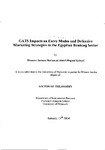GATS Impacts on Entry Modes and Defensive Marketing Strategies in the Egyptian Banking Sector
| dc.contributor.author | Lotayif, Mansour Salman Mohamad Abdel-Maguid | |
| dc.contributor.other | Plymouth Business School | en_US |
| dc.date.accessioned | 2013-09-11T11:35:23Z | |
| dc.date.available | 2013-09-11T11:35:23Z | |
| dc.date.issued | 2004 | |
| dc.identifier | NOT AVAILABLE | en_US |
| dc.identifier.uri | http://hdl.handle.net/10026.1/1660 | |
| dc.description.abstract |
This research examines the effects of GATS agreements, both on entry modes and defensive marketing strategies in the Egyptian banking sector. The research population is the Egyptian banking sector, employing a total of 83179, from which a representative sample (equal to 800 responses) was selected. As the research aims are diversified, this sample was divided into two main groups i.e. local banks and foreign branches, investigated using different questionnaires. The latter population includes all the foreign branches working in the Egyptian market; the former includes all banks working in Egypt regardless of their ownership status. Four objectives have been pursued in this research: - (1) Exploring GATS impacts on the Egyptian banking sector as well as identifying variables that affect their perception; (2) Identifying the appropriate defensive marketing strategies for each entry mode and evaluating the marketing practices of the Egyptian banking sector; (3) Identifying pattems of relationships between defensive marketing strategies and four sets of variables (demographics, objectives, rivals, and rivals' competitive advantages); and (4) Determining the factors that affect the selection of each entry mode. Regarding the first research objective, the findings reveal that GATS agreements have positive impacts on the Egyptian banking sector, with significant relationships observed between the perception of GATS impacts and the respondents backgrounds. Secondly, an "Entry Modes- Defensive Marketing Strategies Model" was designed, recommending specific defensive marketing strategies for each bundle of entry modes. Thirdly, strong and significant relationships appear, between selected defensive marketing strategies and four sets of variables i.e. demographics, bank's objectives, perceived competitors, and competitors' competitive advantages. Finally, the selection of entry modes is affected by both bank and target market characteristics. The latter include political stability as well as instability, language differences, religious similarities, values differences, severe competition, and moderate levels of competition; the former include greater as well as less financial resources, and less international experience. The applicability and suitability of these findings for other similar Afiican and Middle East countries are identified. | en_US |
| dc.language.iso | en | en_US |
| dc.publisher | University of Plymouth | en_US |
| dc.title | GATS Impacts on Entry Modes and Defensive Marketing Strategies in the Egyptian Banking Sector | en_US |
| dc.type | Thesis | |
| plymouth.version | Full version | en_US |
| dc.identifier.doi | http://dx.doi.org/10.24382/4219 | |
| dc.identifier.doi | http://dx.doi.org/10.24382/4219 |
Files in this item
This item appears in the following Collection(s)
-
01 Research Theses Main Collection
Research Theses Main


